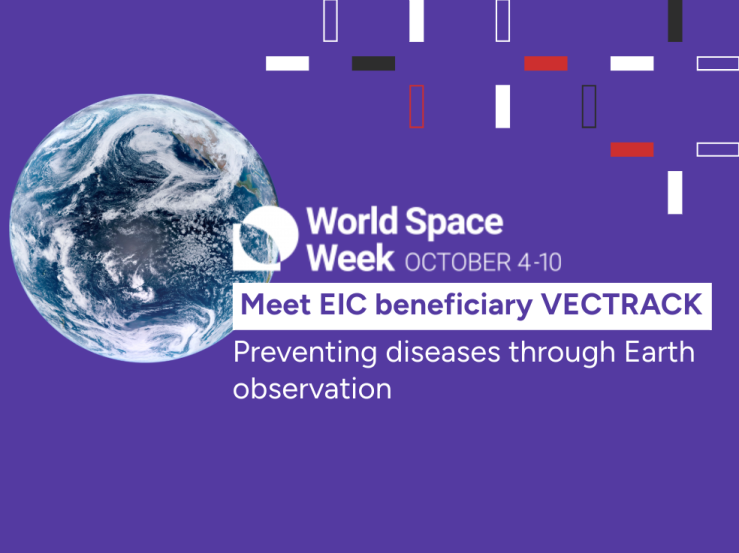Since 1999 – the year of its proclamation – the World Space Week takes place every year from 4 October to 10 October, celebrating the countless contributions by innovators in science and technology to the betterment of the human condition.
In light of this year’s theme, ‘Space and Climate Change’, we are spotlighting a Fast Track to Innovation (FTI) EIC-funded project named VECTRACK. Cutting-edge researchers are working together to find a solution to the challenge of detecting and preventing the transmission and outbreak of vector-borne diseases, threatening Europe due to a warming planet.
While ways of controlling disease-vectors are already available in the market, the technology in the field has not changed significantly over the last 100 years, as João Encarnação, CEO of IRIDEON SL – coordinating the VECTRACK project – notes. The solution developed by VECTRACK is poised to revolutionise the field using satellites for real-time monitoring, thereby reducing costs and lengthy times previously required for the operations.
The problem: adapting to climate change in Europe
The West Nile virus outbreak in Europe in the summer of 2018 well exemplified how the vectors through which animal, plant and human diseases spread around the world are becoming more mobile. Through ground nodes with optoelectronic sensors, VECTRACK’s researchers can carry analyses not only of the morphology of the insects carrying the vector-borne diseases, but also of how they move thereby generating a spectrum similar to a fingerprint, containing all the information about each specific insect.
The solution: real-time tracking of mosquitoes carrying vector-borne diseases
Surveillance programs carried out by public and private bodies in the field are usually costly and time-consuming, with manual field trap inspections representing 95% of total costs. VECTRACK’s solution to significantly reduce the latter costs consists in combining cost-efficient sampling strategies, remote sensing and spatial modelling techniques resulting in risk maps for targeted surveillance and risk assessments.
VECTRACK’s key achievement: machine learning integration
Among the achievements of the EIC-funded project, that of succeeding in using machine learning techniques for interpreting data for the recognition of specific species of mosquitos is among the most noticeable. Additionally, recent pilot studies involving public health authorities to stress test the company’s technology proved that the latter can successfully distinguish mosquitoes from other insects and can identify their sex with an average accuracy beyond 85%.
Recent discoveries and future prospects
Through the development of an Earth Observation (EO) Satellite Sentinel service, VECTRACK will provide the first transnational and automated vector surveillance system. Furthermore, through the development of an innovative business plan, an extensive market demonstration and the implementation of a knowledge management and protection strategy, VECTRACK will be commercialized as a service to the market segments already covered by the industry partners as well as to new international clients.
VECTRACK’s researchers’ recent discovery, through the pilot studies conducted, revealed that the project’s pioneering technology enables to determine the age of the monitored mosquitoes, whether above or below five days old. As João Encarnação - CEO of IRIDEON SL - highlighted the latter data can be crucial since female mosquitoes less than five days old do not present a high risk of carrying infectious diseases; the same cannot be said for female mosquitoes over 5 days old.
Additional information
VECTRACK is a project funded by the European Innovation Council (EIC) under the Fast Track to Innovation (FTI) funding programme, supporting industry-strong consortia to convert highly innovative ideas that are already in an advanced development phase into marketable products. IRIDEON SL coordinates the project, which benefits from a multidisciplinary team of engineers with experience both in the industry and academia realms.
For more information on the VECTRACK project and its transformative impact on addressing the impacts of climate change, please visit the dedicated page on CORDIS.
Other EIC beneficiaries you should keep an eye on:
University of Lund, Sweden (EIC Pathfinder)
Led by the University of Lund, Sweden, over the next four years the EIC-funded ZEUS project will focus on advancing the development of nanowire solar cells, a highly innovative and radiation-resistant photovoltaic technology. The goal of the researchers is to enhance the efficiency of space-tested nanowire solar cells from the current 15% up to 47%.
For further information on the EIC-funded project, please consult the dedicated project page on CORDIS.
D-Orbit, Italy (EIC Accelerator)
With the recent closing of the second and final phase of its Series C investment round, and a capital raised exceeding €150 million, the Italian startup D-Orbit is on the right path towards the acceleration of collaborations with governments and space agencies aimed at expanding customer reach of its smart device, capable of standalone operations that can be installed into satellites.
For further information on the EIC-funded project, please consult the dedicated project page on CORDIS.

DISCLAIMER: This information is provided in the interest of knowledge sharing and should not be interpreted as the official view of the European Commission, or any other organisation.

